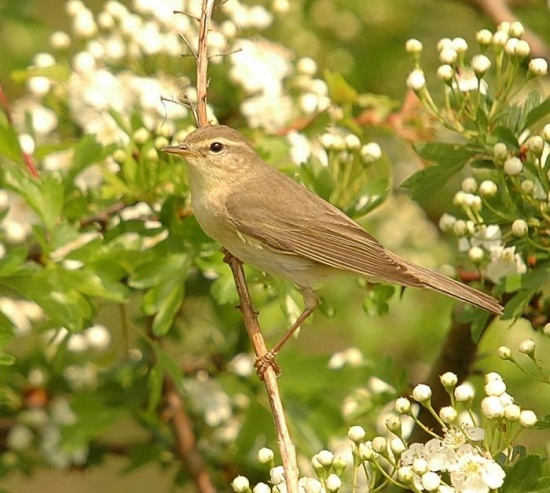| Line 1: | Line 1: | ||
| − | ; | + | ;[[:Category:Phylloscopus|Phylloscopus]] trochilus |
| − | |||
| − | [[ | ||
| + | [[Image:Willy 32.jpg|thumb|550px|right|Photo by mali <br />Location: [[Lakenheath Warren]], England]] | ||
| + | |||
==Identification== | ==Identification== | ||
| − | Grey-green back, pale | + | Grey-green back, pale underparts, yellow tinged chest and throat, pale supercillium. |
==Distribution== | ==Distribution== | ||
| − | Breeds throughout the [[British Isles]], [[Scandinavia]] and northern [[Russia]] south to central and south-east [[France]], [[Switzerland]] and [[Austria]], northern parts of [[Hungary]] and [[Romania]] and to about | + | Breeds throughout the [[British Isles]], [[Scandinavia]] and northern [[Russia]] south to central and south-east [[France]], [[Switzerland]] and [[Austria]], northern parts of [[Hungary]] and [[Romania]] and to about 50°N in [[Ukraine]] and [[Russia]]. |
Leaves breeding areas in August-September, passage continuing until October, and winters in sub-Saharan [[Africa]], returning mainly in April. Abundant on passage over most of Europe, the Middle East and North Africa. | Leaves breeding areas in August-September, passage continuing until October, and winters in sub-Saharan [[Africa]], returning mainly in April. Abundant on passage over most of Europe, the Middle East and North Africa. | ||
| Line 14: | Line 14: | ||
==Taxonomy== | ==Taxonomy== | ||
| − | Subspecies: Nominate ''trochilus'' occurs over much of western Europe with ''acredula'' in northern Scandinavia and Europe from Poland eastwards, very similar but duller and paler below with much less yellow on underparts of juvenile. Eastern race ''yakutensis'' drabber still, brown above and whitish below, occurs as a migrant in Region including Britain but other races can appear very similar. | + | '''Subspecies:''' Nominate ''trochilus'' occurs over much of western Europe with ''acredula'' in northern Scandinavia and Europe from Poland eastwards, very similar but duller and paler below with much less yellow on underparts of juvenile. Eastern race ''yakutensis'' drabber still, brown above and whitish below, occurs as a migrant in Region including Britain but other races can appear very similar. |
==Habitat== | ==Habitat== | ||
| Line 22: | Line 22: | ||
The diet includes small insects and spiders and fruit and berries. | The diet includes small insects and spiders and fruit and berries. | ||
| − | They build domed nest from grass, rotten wood, moss and roots, placed on the ground among shrubs or grass, with a side entrance, lined with fine roots and feathers. 3-9 smooth, glossy white eggs, speckled with reddish-brown, are laid and are incubated by the female for 13 days. Both parents feed the young | + | They build domed nest from grass, rotten wood, moss and roots, placed on the ground among shrubs or grass, with a side entrance, lined with fine roots and feathers. 3-9 smooth, glossy white eggs, speckled with reddish-brown, are laid and are incubated by the female for 13 days. Both parents feed the young, which fledge after about 13-16 days. |
| Line 32: | Line 32: | ||
==External Links== | ==External Links== | ||
{{GSearch|Phylloscopus+trochilus}} | {{GSearch|Phylloscopus+trochilus}} | ||
| − | [[Category:Birds]] | + | [[Category:Birds]] [[Category:Phylloscopus]] |
Revision as of 05:39, 28 August 2008
- Phylloscopus trochilus
Identification
Grey-green back, pale underparts, yellow tinged chest and throat, pale supercillium.
Distribution
Breeds throughout the British Isles, Scandinavia and northern Russia south to central and south-east France, Switzerland and Austria, northern parts of Hungary and Romania and to about 50°N in Ukraine and Russia.
Leaves breeding areas in August-September, passage continuing until October, and winters in sub-Saharan Africa, returning mainly in April. Abundant on passage over most of Europe, the Middle East and North Africa.
Vagrants recorded on Iceland, the Azores and Cape Verde Islands, and in Alaska.
Taxonomy
Subspecies: Nominate trochilus occurs over much of western Europe with acredula in northern Scandinavia and Europe from Poland eastwards, very similar but duller and paler below with much less yellow on underparts of juvenile. Eastern race yakutensis drabber still, brown above and whitish below, occurs as a migrant in Region including Britain but other races can appear very similar.
Habitat
Open deciduous woodland, bushy areas, parks and gardens. Also in mixed forest and young conifer plantations, hedgerows and shelterbelts. On passage occurs in all types of habitat with trees and bushes.
Behaviour
The diet includes small insects and spiders and fruit and berries.
They build domed nest from grass, rotten wood, moss and roots, placed on the ground among shrubs or grass, with a side entrance, lined with fine roots and feathers. 3-9 smooth, glossy white eggs, speckled with reddish-brown, are laid and are incubated by the female for 13 days. Both parents feed the young, which fledge after about 13-16 days.
Birdsong
<flashmp3>Phylloscopus trochilus (song).mp3</flashmp3>
Listen in an external program




